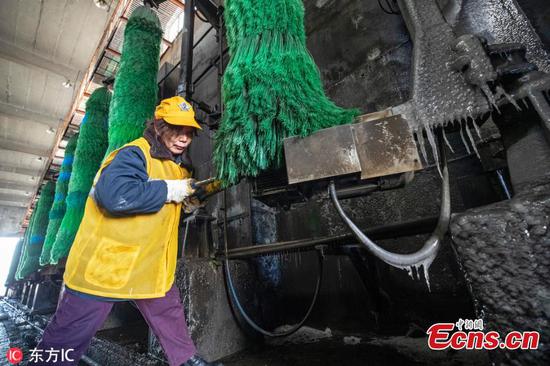Things for Peng Jindong's small e-store, which mainly sells street-dance wear on the leading Chinese online marketplace Taobao, first took off when he obtained a non-collateral credit line of 1 million yuan ($148,000) a few years ago from Zhejiang E-commerce Bank Co Ltd, one of the first five private banks established in China as pioneers of a pilot program.
That was later extended to 2 million yuan after the bank used big data to analyze potential risks.
With the help of the loan, Peng contracted a small clothing factory, and hired five fashion designers and more than 10 employees. He also rented a 1,000-square-meter office and a similar-sized warehouse in Hangzhou, Zhejiang province. He now owns a clothing brand called Mmaicco, specializing in men's sweaters.
Although his company is still very small, Peng said he also wants to run a business for 102 years, just like the practice of Jack Ma, the founder of Alibaba Group Holding Ltd that launched Taobao and backed Zhejiang E-commerce Bank, better known as MYbank.
Since it opened for business on June 25, 2015, MYbank has concentrated on offering small credit loans to small and micro clients, providing them with comprehensive financial services. Ant Financial, Alibaba's finance affiliate, is the largest shareholder of the bank, holding a 30 percent stake in it.
The bank extends loans based on information it collects on customers from all across the different platforms of Alibaba Group, such as the business-to-business marketplace Alibaba.com, the online consumer-to-consumer marketplace Taobao, and the third-party online payment service provider Alipay.
As of the end of June 2018, MYbank had served 10.42 million small and microenterprises, providing credit worth 1.88 trillion yuan to its clients, including small businesses, consumers and farmers, according to the data posted on its website.
Its 2017 annual report shows that the bank extended loans totaling 446.8 billion yuan to small and microenterprises and small business owners that year. Of that, more than 26 billion yuan went to rural clients.
As of the end of 2017, the loan balance per small and micro client of the bank was around 28,000 yuan on average. Yet despite the focus on small, often new firms, the bank's nonperforming loan ratio was just 1.23 percent.
In March 2014, China launched a pilot program to establish banks owned entirely by private companies. MYbank was among the first, following the likes of WeBank Co Ltd, Wenzhou Minshang Bank Co Ltd, Kincheng Bank of Tianjin Co Ltd, and Shanghai HuaRui Bank Co Ltd which all went live between December 2014 and June 2015.
By the end of 2017, the total assets of these first five private banks had increased 33 percent year-on-year to 228.19 billion yuan. Their total loans and advances also went up 29 percent year-on-year to 105.81 billion yuan, according to their annual reports.
Among the five, WeBank and MYbank are the two largest by total assets. While MYbank primarily targets small and micro corporate clients, WeBank, China's first digital bank without any physical branch, is more committed to serving individual clients by using big data analytics to offer personal banking products such as character loans, which refer to a type of unsecured loan made by faith in the borrower's reputation and credit.
"These wave-riders established by private enterprises have formed their own characteristics in terms of business models, market positioning and risk control, making up for weaknesses in the existing banking system and playing an active role in mitigating private enterprises' difficulties in accessing finance," said Dong Ximiao, associate dean of the Chongyang Institute for Financial Studies at Renmin University of China, in the finance and economics publication Economic View.
To further improve the capability of private banks to serve private enterprises, he said, regulators should moderately loosen market entry requirements for private banks, encourage them to gradually add branches and outlets within the region where they are registered, revise current rules to expand these banks' sources of capital, and allow them to become pilots in product and service innovation.


















































